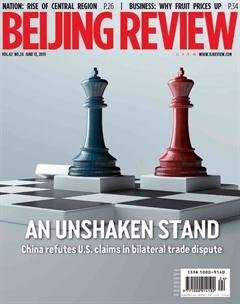Clearing the Air
As negotiations continue to resolve the China-U.S. trade friction, which is the cynosure of international attention, there are rumors that China is trying to undermine the talks. In order to clarify the facts and present Chinas position on these consultations, the State Council Information Office issued a white paper, Chinas Position on the China-U.S. Economic and Trade Consultations, on June 2.
The document details the basic conditions of bilateral trade and economic consultations, Chinas position and principles, the impact of the trade friction, and the repeated U.S. backtracking during the talks.
Economic and trade relations are the ballast and propeller of China-U.S. relations. They are fundamental to both countries, as well as to global prosperity and stability. The trade war unleashed by the U.S. in March 2018 compelled China to take countermeasures. But all along, China has been advocating settling issues through dialogue and agreed to several rounds of consultations in the interest of stabilizing bilateral trade and economic ties.
During the talks, China has followed the principle of mutual respect, equality and mutual benefit. China believes that threatening a trade war and continuously raising tariffs will not help to resolve trade and economic issues.
However, the U.S. Government is adamant that all agreements must only be in favor of the U.S. It has gone back on its words and tried to dictate its own terms. But China will never accept agreements that are unfair and hurt its dignity.
Trade frictions are neither in the interest of China nor the U.S., the worlds top two economies that are also economically linked. The protracted trade friction has not only impacted economic growth of both sides, but also affected the world economy adversely. If the U.S. continues to turn a blind eye to the extensive damage, it will inevitably drag the entire world economy into a direr crisis.
A mutually beneficial and win-win agreement will be the best outcome of the trade talks. It is also an outcome that the rest of the world desires. It is hoped that the U.S. can shelve the differences in trade and see the reason for cooperation. When the bilateral relationship is strengthened by coordination, cooperation and stability, it is not only for the benefit of both the countries but the world at large.

